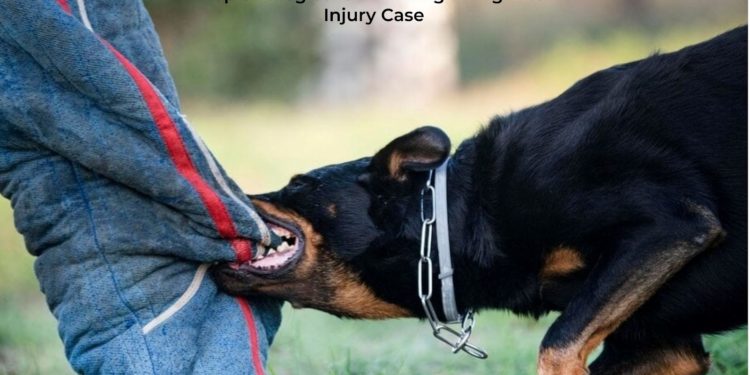It may be physically and psychologically traumatizing for someone to be a victim of a dog bite injury. In most cases, victims of such an injury claim compensation concerning medical expenses, pain and suffering, lost wages, and other damages. In case you are a victim of a dog bite, there are legal options available to pursue a compensation claim. But again, winning any case is an art that requires proper planning, evidence gathering, and legal expertise. Here are the top ways through which you can have an upper hand in a dog-bite injury case.
1. Consult an Experienced Personal Injury Attorney
Cases of dog bites are easy to complicate, especially on the issue of liability and damage claims. Experienced personal injury attorneys’ cases on dog biting will enhance one’s understanding of the local jurisdiction and due process of law skills. Such an attorney will get one to know how to present your case, which will increase returns from insurance companies.
If in Norfolk, find a personal injury attorney norfolk that knows the specific laws and regulations of the area where you are located. A local attorney would help be able to guide you through the process, see that deadlines are met, and build on a case for you.
2. Seek Immediate Medical Attention and Document Injuries
First things first, get yourself to a hospital after the dog bites you; it’s as much about health care as it is a record of your injuries that could prove priceless to your case. Ensure that you retain the medical bills and receipts along with all the medical records. Pics taken at different stages of recovery also help monumentally in showcasing the severity of the bite or the depth at which there has been damage.
But in case, the infections or follow-up treatments do not go well, then all this documentation will have to play a major role in trying to prove an ongoing influence of the bite.
3. Report the Incident to Animal Control or Local Authorities
After visiting a medical facility for proper treatment, file a report of the dog attack incident to the local animal control or law enforcement agency. This will mean that an official record of the event is made, which can be used as evidence in your case. In general, authorities will begin by looking into the circumstances surrounding the incident of the bite, such as if the dog has a history of attacking someone, if it was up to date with vaccinations, and whether or not the owner was negligent enough to not control the dog.
This also aids in establishing the timeline of the accident, which can prove important for liability purposes. Ensure that you receive a copy of the report for your files.
4. Gather Evidence at the Scene
Assuming that it is safe to do so, gather as much evidence as possible from the scene of the dog attack. This may include:
- Photos of the dog, the location where the bite occurred, and any visible injuries.
- Witness Statements: Collect contact information from any witnesses of the attack. Ask if they are willing to provide a statement about what they witnessed.
- The Dog’s Information: Be sure to obtain the owner’s contact information along with his veterinary records, if available, on the dog’s vaccination and medical history.
Such evidence will no doubt assist your attorney in ascertaining liability as well as strengthen your case depending on whether or not the dog has such a history of attacks and if the owner is proven to be negligent and irresponsible in handling the dog.
5. Understand the Law Regarding Dog Bite Liability
Dog bite laws vary significantly from state to state, so it is important to know the dominant legal regime that applies in your jurisdiction. In some states, for example, there is what’s known as a “strict liability” rule. The idea behind this is that an owner automatically assumes responsibility for injuries caused by their dog, without regard to the dog’s history or even the owner’s knowledge of its behavior. Some states have “one-bite” doctrines where the owner is liable only if the dog has bitten someone or demonstrated a propensity to attack.
Occasionally comparative negligence applies, meaning the compensation to the claimant will be minimized if the claimant provoked the dog or had entered the owner’s property illegally. Knowing how this law should be applied to your case can help you and your lawyer design the right legal strategy.
Frequently Asked Questions (FAQs)
1. What should I do immediately after being bitten by a dog?
Although the wound may appear minor, after a dog bite, one should visit a medical facility. He or she should then clean the wound, report the incident to the local authorities in charge of animals for control, and also take photographs along with witness statements. Additionally, get a tetanus shot or rabies vaccine if the dog’s history of vaccination is questionable.
2. How can I determine if the owner of the dog is liable for my injuries?
Liability for a dog bite varies by state. Many states have a “strict liability” statute, which automatically makes the owner liable for any injury caused by the dog. Other claims will simply require you to plead and prove negligence- such as failure by the owner to exercise control over a dangerous animal or failure to exercise reasonable precautions to prevent the animal from attacking. An experienced personal injury attorney in Norfolk will help determine liability under your circumstances.
3. Can I file a claim on a dog bite if the owner of the dog does not have any form of insurance coverage?
You can still claim a dog bite, even if the dog owner is uninsured. If the dog is covered under the homeowner’s insurance, your claim will be covered under their liability policy. If the dog owner is uninsured, you may collect compensation from your health insurance or PIP, depending on your state’s laws. An attorney can help explore all possible options.
4. How long can I file the claim for being bitten by a dog?
While states vary, typically, a statute of limitations on personal injury caused by dog bites ranges from one to three years after the date of injury. In case you are planning to file your case, you have to do it before the period expires so that your right to get your entitlement is not lost. An accident lawyer would ensure that you file your case within the time frame that the law dictates.
Conclusion
A dog bite injury case requires prompt action and proper documentation along with the help of legal expertise and an effective strategy. Be it hospital treatment along with evidence gathering, knowledge about the local laws as well as how to approach a seasoned attorney, all of this serves to strengthen the case to litigate further. With the right approach and guidance, it will be easier to fight for the requisite compensation for injuries or losses.











































































